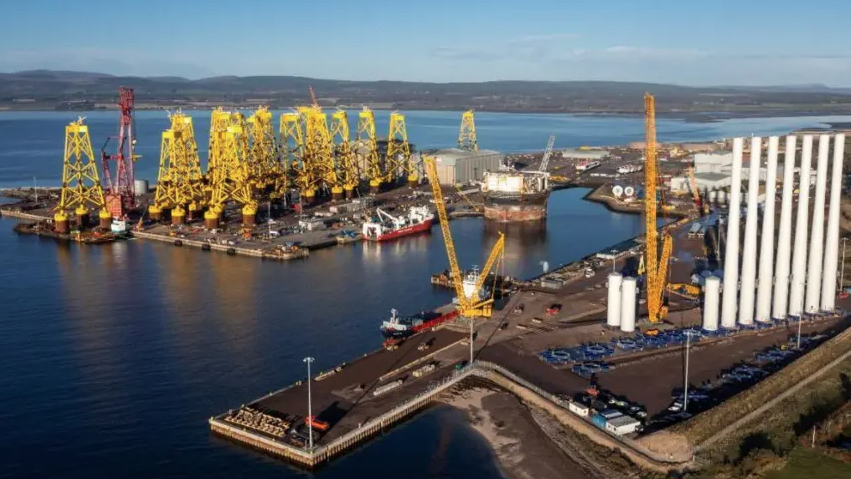Japanese investor completes takeover of Highland port

The Port of Nigg has been sold to Japanese investor Mitsui for an undisclosed sum
- Published
A Japanese investor has completed its takeover of a port in the Highlands.
Global Energy has sold the Port of Nigg and its fabrication arm to minority investor Mitsui for an undisclosed sum.
The site, in Easter Ross on the Cromarty Firth, is seen as vital to the expansion of offshore wind and is a leading part of one of Scotland's two green freeports.
The port has received about £120m of investment, including some public funding, in the past 14 years to upgrade its facilities.
Mitsui took a 25.5% stake in Global Energy, owned by businessman Roy MacGregor, in 2012.
The Tokyo-based firm brings specialism in engineering, energy, shipping and port operations.
The company said it hoped to further expand manufacturing capacity and infrastructure for both the on and offshore markets after completing the deal.
Special customs area set up at Highland port
- Published13 February
Scotland's first green freeports announced
- Published13 January 2023
Stuart Black, chief executive of Highlands and Islands Enterprise (HIE) said the takeover would "strengthen the port's future as an industry hub".
He added: "The offshore wind industry represents a massive economic opportunity for the Highlands and Islands, and Scotland and the Port of Nigg is at the heart of that.
"Nigg is a prime location for manufacturing components and a magnet for inward investment.
"We look forward to continuing our collaborative working relationship with Mitsui noting the vote of confidence this gives the area."
HIE announced a £10m investment in the port in March to create a new heavy-duty quayside.
At the time, the deputy first minister, Kate Forbes, described it as a "catalyst for further investment".
Nigg received its green freeport status in January 2023, alongside Forth Ports.
Green freeports are able to offer tax incentives and lower tariffs within the zones they cover.
However, they have commitments to meeting net zero targets and supporting fair work practices.
In February, HMRC gave it permission to have some of its own customs arrangements, meaning taxes and certain duties on goods arriving do not have to be paid.

It's hoped that making the transition from fossil fuels to renewable energy will bring a new economic boom to the north and east of Scotland.
The Port of Nigg is first in the queue, having had £120m of investment in its 1,200 metres of quayside, fabrication halls and space for the laydown of huge turbine components.
It's also the first facility to qualify as one of Scotland's two green energy freeports and a large Sumitomo subsea power cable factory is being built on a neighbouring site.
But for now, much of this remains anticipation. The sector is in a hiatus as big projects are delayed, awaiting pricing clarity from government and regulator Ofgem, as well as planning consents and investment decisions amid global economic uncertainty.
For a company such as Global Energy Group, loaded up with debt and yet to secure a steady flow of contracts, a sale to a bigger investor with deeper pockets may have become unavoidable.
It means a smaller future for one of the energy sector's best performers of recent years.
This sale can be seen as a positive sign that Mitsui – a vast conglomerate across numerous countries and sectors – has chosen to put its heft behind the renewable energy potential of Scotland and the Highlands.
It also means that decisions about the future of Nigg will be made in Japan.
Foreign investment is one of the strengths of the Scottish economy. But ownership and control in distant cities can also be its weakness, as we've seen recently for Falkirk bus-builder Alexander Dennis and with the Grangemouth oil refinery.